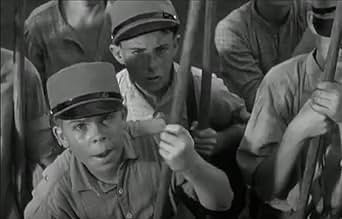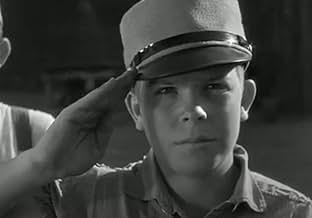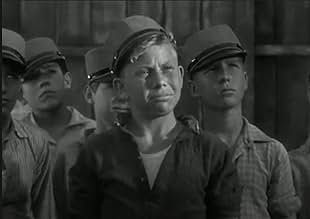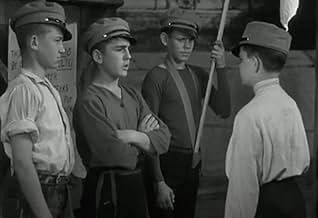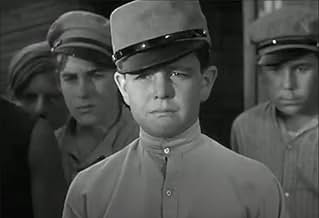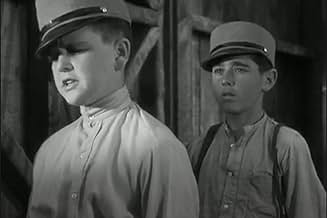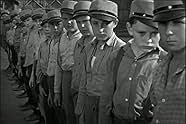IMDb RATING
6.9/10
579
YOUR RATING
Frail Nemecsek, a lonely boy craving belonging, idolizes charismatic Boka, leader of a gang, in an evocative depiction of youth's pain and war's senselessness.Frail Nemecsek, a lonely boy craving belonging, idolizes charismatic Boka, leader of a gang, in an evocative depiction of youth's pain and war's senselessness.Frail Nemecsek, a lonely boy craving belonging, idolizes charismatic Boka, leader of a gang, in an evocative depiction of youth's pain and war's senselessness.
- Director
- Writers
- Stars
- Awards
- 3 wins & 1 nomination total
George P. Breakston
- Nemecsek
- (as George Breakston)
Jimmy Butler
- Boka
- (as Jimmie Butler)
Samuel S. Hinds
- Father
- (as Samuel Hinds)
- Director
- Writers
- All cast & crew
- Production, box office & more at IMDbPro
Featured reviews
Is this an allegory? Is it intended to show the futility of war? Is it just a story of a moment of boys' life? Supposedly it is somewhat autobiographical, a story by Ferenc Molnar.
Whatever its intent, and I suppose a viewer is allowed to see what he wants, it is a moving and beautifully done film.
There is one very sad irony: Jimmy Butler, who gives a magnificent performance, and who shows so much talent you just know he is going to be a big star, was later a casualty of the real war, World War II.
He shows astonishing presence, especially for one so young -- he was 13 when "No Greater Glory" was released -- and gave a performance not surpassed by many adults.
Frankie Darro, sometimes billed as "Darrow," was nearly always simply great (You must see him in "Wild Boys of the Road," where he performs surely the first "break dance" on film.), and he is a stand-out here.
Ralph Morgan and Lois Wilson are wonderful as parents of the boy played by George Breakston, just heartbreaking as they wish their little son recovery from his illness.
Really, even when an occasional player is less than great, this movie and the portrayals are enthralling.
Turner Classic Movies is to be commended for letting us see this.
Whatever its intent, and I suppose a viewer is allowed to see what he wants, it is a moving and beautifully done film.
There is one very sad irony: Jimmy Butler, who gives a magnificent performance, and who shows so much talent you just know he is going to be a big star, was later a casualty of the real war, World War II.
He shows astonishing presence, especially for one so young -- he was 13 when "No Greater Glory" was released -- and gave a performance not surpassed by many adults.
Frankie Darro, sometimes billed as "Darrow," was nearly always simply great (You must see him in "Wild Boys of the Road," where he performs surely the first "break dance" on film.), and he is a stand-out here.
Ralph Morgan and Lois Wilson are wonderful as parents of the boy played by George Breakston, just heartbreaking as they wish their little son recovery from his illness.
Really, even when an occasional player is less than great, this movie and the portrayals are enthralling.
Turner Classic Movies is to be commended for letting us see this.
This is a bizarre and very heavy-handed film. Instead of showing adults at war, this film does war on a small scale--with children playing war. This isn't just kids playing war, but they have ranks, follow orders and act much like adults would in war. And, almost the entire film consists of kids acting--with only a few adults here and there. This strange idea seemed to impress most of the reviewers but I couldn't get into it--mostly because it all seemed rather fake and I also thought that children playing war and acting as if it's all lots of fun just seemed a bit grotesque. Although I know it was meant as an allegory about war and heroism and the futility of war--it seemed like it could also be taken as a pro-war film as well! As for the kids, all but Frankie Darro were unknowns and the acting, for kids, was pretty good. But it was also sappy from start to finish--and also made war seem pretty cool--like a recruitment film for the next war.
I guess I am a voice of dissent, but I didn't like the film--though I did at least respect the acting (for the most part) and give it a 4 simply for technical merit. Also, I nominate George P. Breakston for a special award for Best Performance By a Crazy Kid for his acting at the 61 minute mark. It has to be seen to be believed. Further, I nominate all the parents for the Most Irresponsible Parenting award for encouraging their little ragamuffins to become little warmongers.
I guess I am a voice of dissent, but I didn't like the film--though I did at least respect the acting (for the most part) and give it a 4 simply for technical merit. Also, I nominate George P. Breakston for a special award for Best Performance By a Crazy Kid for his acting at the 61 minute mark. It has to be seen to be believed. Further, I nominate all the parents for the Most Irresponsible Parenting award for encouraging their little ragamuffins to become little warmongers.
No Greater Glory (1934)
*** (out of 4)
A rather strange anti-war film that tells the story of two rival kid gangs who are planning to go to war in order to fight over a vacant playground that both sides want. Jimmy Butler plays Boka, a small child who is the only Private in his gang, because he's so small, yet he's the only one will to risk his neck for the greater good of the gang. I've heard people call this a Our Gang Goes to War film and perhaps that isn't too far off base but in the end this is a film I respected a lot more than enjoyed. I'm sure many, many people are going to watch this film and love it but I wouldn't go that far. I think the message is loud and clear but to me it's way too loud and clear. This is the second film I've seen from Borzage's career during this period, the other being Young America, and there's no doubt he wants to get his views across but I think in both films he goes a little overboard. The most impressive thing about this film are the child performances, which range from very good to downright excellent. I was very impressed with the young Butler not only because of his acting but because of his small structure and his ability to rise up and battle. It was a little sad and ironic when I read that he would die in WW2 fighting for his country. George P. Breakston, Jackie Searl and Frankie Darro also add nice work with future Dick Tracy Ralph Morgan having a small role. Another major plus was the cinematography, which looked extremely well and so focused that you couldn't help but feel as if you were there during all the action. The ending, which goes for emotions, certainly gets them and remains one of the most powerful scenes from this era.
*** (out of 4)
A rather strange anti-war film that tells the story of two rival kid gangs who are planning to go to war in order to fight over a vacant playground that both sides want. Jimmy Butler plays Boka, a small child who is the only Private in his gang, because he's so small, yet he's the only one will to risk his neck for the greater good of the gang. I've heard people call this a Our Gang Goes to War film and perhaps that isn't too far off base but in the end this is a film I respected a lot more than enjoyed. I'm sure many, many people are going to watch this film and love it but I wouldn't go that far. I think the message is loud and clear but to me it's way too loud and clear. This is the second film I've seen from Borzage's career during this period, the other being Young America, and there's no doubt he wants to get his views across but I think in both films he goes a little overboard. The most impressive thing about this film are the child performances, which range from very good to downright excellent. I was very impressed with the young Butler not only because of his acting but because of his small structure and his ability to rise up and battle. It was a little sad and ironic when I read that he would die in WW2 fighting for his country. George P. Breakston, Jackie Searl and Frankie Darro also add nice work with future Dick Tracy Ralph Morgan having a small role. Another major plus was the cinematography, which looked extremely well and so focused that you couldn't help but feel as if you were there during all the action. The ending, which goes for emotions, certainly gets them and remains one of the most powerful scenes from this era.
No Greater Glory is Frank Borzage's adaption of a biographical novel by Ferenc Molnar. It's set in the postwar depression that Germany had after World War I. As it opens we first see a veteran talking about the futility of war and then it cuts to a German school where the boys, there are no women in this film other than the lead character's mother, are being spoonfed the same militaristic propaganda that sent Lew Ayres and his friends off to the trenches.
These kids learn well and Lord of the Flies like they split into communities, rival communities that we call gangs. The gang we first meet is the Paul Street Boys and their leader Jimmy Butler. Another group of slightly older kids are trying to push these kids out of the vacant lot that the Paul Street kids play in. This means war and these kids have developed their own rules about it.
One kid, small and scrawny George Breakston wants so much to belong to the gang, but the others tease him and tell him he's too little. He spends the rest of the film trying to prove himself worthy.
No Greater Glory is a really heartbreaking film about kids with misplaced values, the kind who would later become good recruiting fodder for the Nazis. Breakston's performance will elicit tears from the stone lions at the New York Public Library. Frankie Darro and Butler as the rival gang leaders do well by their roles.
I'd love to know how Frank Borzage got Harry Cohn at Columbia Pictures to OK this project. It's a B film, no big stars involved at all, still it's not the most commercial of projects. Yet if you do see it, you will discover a classic.
These kids learn well and Lord of the Flies like they split into communities, rival communities that we call gangs. The gang we first meet is the Paul Street Boys and their leader Jimmy Butler. Another group of slightly older kids are trying to push these kids out of the vacant lot that the Paul Street kids play in. This means war and these kids have developed their own rules about it.
One kid, small and scrawny George Breakston wants so much to belong to the gang, but the others tease him and tell him he's too little. He spends the rest of the film trying to prove himself worthy.
No Greater Glory is a really heartbreaking film about kids with misplaced values, the kind who would later become good recruiting fodder for the Nazis. Breakston's performance will elicit tears from the stone lions at the New York Public Library. Frankie Darro and Butler as the rival gang leaders do well by their roles.
I'd love to know how Frank Borzage got Harry Cohn at Columbia Pictures to OK this project. It's a B film, no big stars involved at all, still it's not the most commercial of projects. Yet if you do see it, you will discover a classic.
What makes NO GREAT GLORY atypical for Borzage is that there is no central romantic couple, but this film, a stirring and vivid anti-war drama from the perspective of children (based on Molnar's THE BOYS OF PAUL STREET, which has been filmed on several other occasions), remains one of Borzage's most powerful, and shows the great range of his talent. Using a large cast of children, he is able to get some of the finest performances from many of the child actors, most of whom were Hollywood veterans by this point: George Breakston, Frankie Darro, etc. Yet here, with Borzage's patient guidance, they give fresh and touching performances. Borzage is always able to find great humanity in his performers, and the sorrowful story becomes truly tragic, because Borzage truly engages your emotions and your mind. This is another movie that is not available, and should be made available (and should be shown as often as possible).
Did you know
- TriviaJimmy Butler was killed during World War II on February 18, 1945 in France.
- ConnectionsEdited from À l'Ouest rien de nouveau (1930)
- How long is No Greater Glory?Powered by Alexa
Details
- Release date
- Country of origin
- Language
- Also known as
- No Greater Glory
- Production company
- See more company credits at IMDbPro
- Runtime
- 1h 14m(74 min)
- Color
- Aspect ratio
- 1.37 : 1
Contribute to this page
Suggest an edit or add missing content

